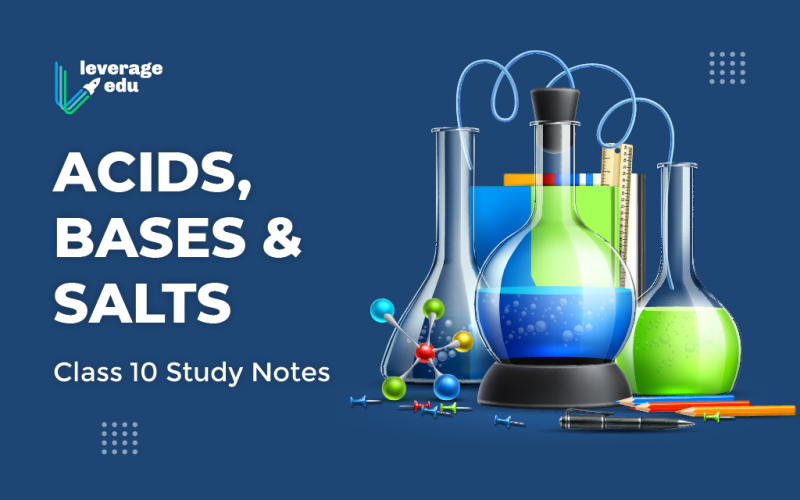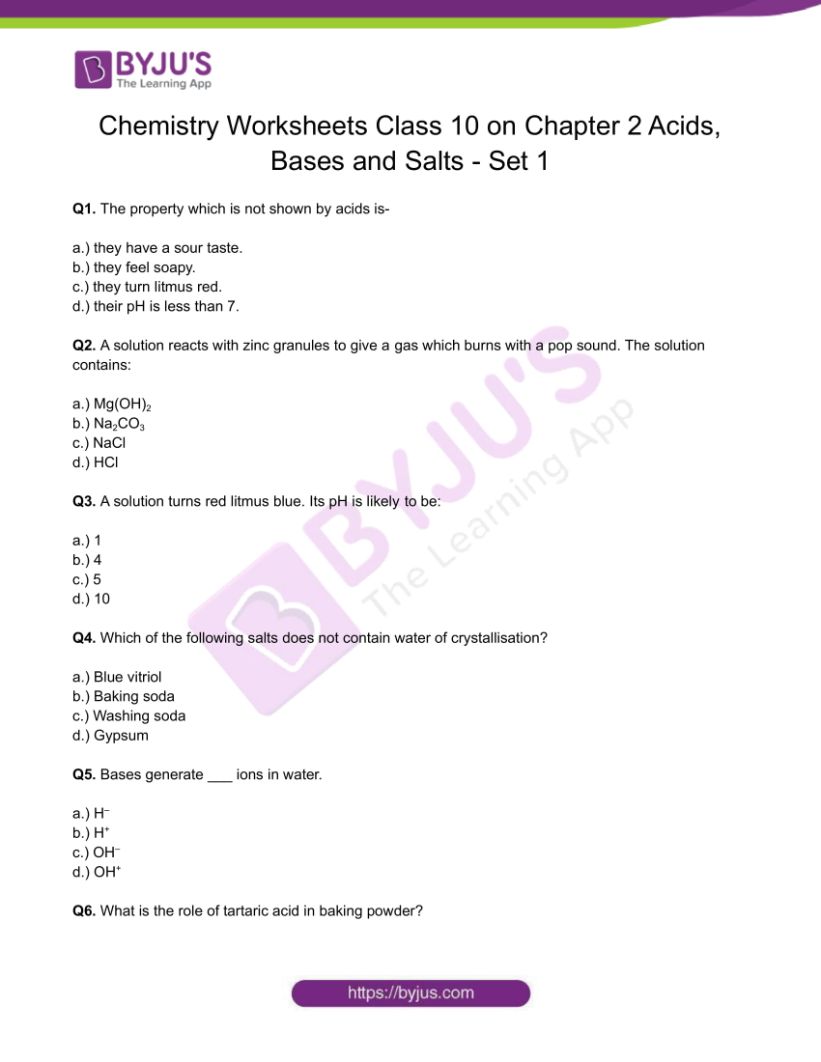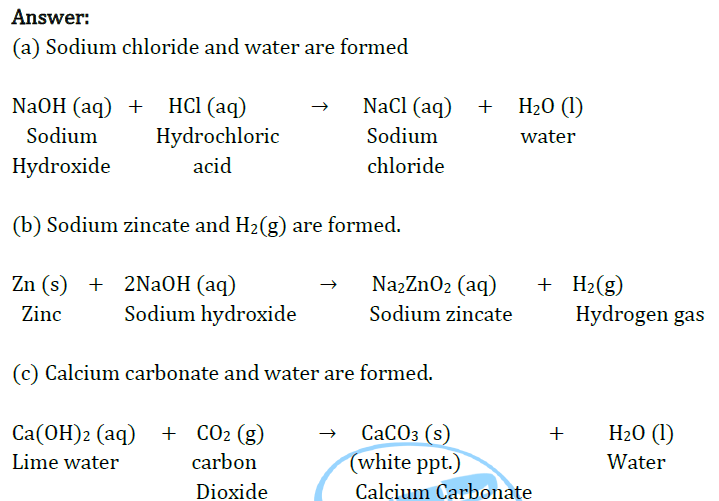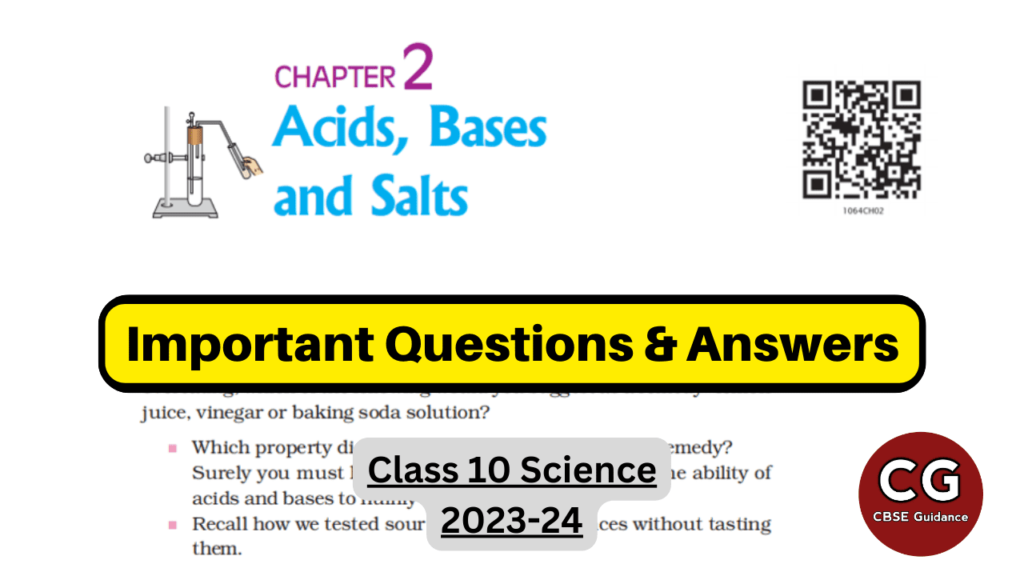Important questions for class 10 Science Chapter 2 Acids Bases and Salts

Introduction In Chapter 2 of Acid, Bases and Salts you will learn about The Chemical Properties of Acids and Bases, Common Characteristics of Acids and Bases, Strong Acid and Base Solution and Characteristics of Salts. Class 10 Acid Bases and Salts Important Questions and Answers Q 1. During the preparation of hydrogen chloride gas on a humid day, the gas is usually passed through the guard.
Class 10 Science Acid Bases and Salts Notes All Important Notes

CBSE Class 10 Sample Question Papers. We hope that by practicing the linked Acid Bases and Salts Class 10 Extra Questions and achieve your dream marks. All the best! Download the Free PDF of CBSE Class 10 Science Chapter 2 Acid Bases & Salts Important Questions with Answers, Extra Questions & solutions gives advantage to 2023-24 Exams.
NCERT Solutions For Class 10 Science Chapter 2 Acids, Bases and Salts (PDF Download)

Answer: Tooth starts decaying when the pH of our mouth is lower than 5.5. This is because below this pH value, the medium of the mouth becomes more acidic due to which tooth enamel corrodes at a faster rate. Question 6. Two solutions X and Y have pH values of 3.0 and 9.5 respectively.
Acids, Bases And Salts Class 10 Definitions Leverage Edu

Answer: The action of enlisted compounds on litmus paper will be as follows. Dry HCI gas: Dry HCl gas would not affect the litmus paper. Moistened NH 3 gas: Moistened NH 3 gas is alkaline in nature. Thus it will turn red litmus blue. Lemon juice: Lemon juice is acidic in nature. Thus it will turn blue litmus red.
Class 10 Science Acid Bases and Salts Notes, Important Questions & Practice Paper

Important Questions Class 10 Science Chapter 2 - Acids Bases And Salts. Science is an essential subject which helps you to comprehend changes in the natural and physical world. Chapter 2 of Class 10 Science is about 'Acids, Bases, And Salts'.
Class 10 Chemistry Worksheet on Chapter 2 Acids, Bases and Salts Set 1

Students can solve NCERT Class 10 Science Acids Bases and Salts Multiple Choice Questions with Answers to know their preparation level. Class 10 Science MCQs Chapter 2 Acids Bases and Salts 1. What happens when a solution of an acid is mixed with a solution of a base in a test tube? (i) Temperature of the solution decreases
Important questions for class 10 Science Chapter 2 Acids Bases and Salts

Acids, Bases And Salts Class 10 Science Extra Questions with Answers Question 1: The pH of a sample of vegetable soup was found to be 6.5. How is this soup likely to taste? Answer: The taste will be slightly sour as it is weakly acidic. Question 2: Which bases are called alkalies? Give an example of alkalies.
Acids, Bases And Salts Class 10 Science Extra Questions with Answers

Question 1. With the help of an example explain what happens when a base reacts with a non- metallic oxide. What do you infer about the nature of non-metal oxide? (Board Term I, 2017) Answer: Oxides of non-metals react with bases to form salt and water. For example, the reaction between carbon dioxide and calcium hydroxide.
Class 10th Science Acid Bases And Salts NCERT Notes CBSE 2023

CBSE Class 10 Chapter 2 Acids Bases and Salt MCQs. Q.1. Many salts absorb water from atmosphere. This property is called. Practice More - CBSE Practice Papers Class 10 (2024) - Free PDF Download. Q.2. An aqueous solution of sodium acetate will turn. (d) all of these.
Class 10 Science Acid Bases and Salts Notes All Important Notes

Answer The colour of litmus in a solution of sodium carbonate is blue. Q5. Name the sodium compound which is used for softening hard water. Answer Sodium carbonate. Short Answer Questions-I (SAQs-I): 2 Marks Q1. Classify the following into acidic oxides anc basic oxides : Na2O, SO2, MgO, CO2 Answer Acidic oxides — SO2, CO2 Basic oxides — Na2O, MgO2
Acids, Bases and Salts Class 10 Important Questions and Answers CBSE Guidance

Solution: Oxides and hydroxides of metals and metal like radicals (e.g., NH4 + ions) are called bases. Bases ionise to give OH - ions in aqueous solution. Bases may be soluble or insoluble in water. The soluble bases are called alkalies. Thus all alkalies are bases but all bases are not alkalies. Examples
ACID,BASE AND SALTS l CLASS 10 l CBSE l PART1 YouTube

Here you can get Class 10 Important Questions Science based on NCERT Text book for Class X. Science Class 10 Important Questions are very helpful to score high marks in board exams. Here we have covered Important Questions on Acids, Bases and Salts for Class 10 Science subject. Science Important Questions Class 10 are given below.
Acid base and salts Solution of NCERT Intext Question, Class 10 YouTube

Two salts 'X' and 'Y' are dissolved in water separately. when phnolphthalein is added to these two solutions, the solutions 'X' turns pink and the solution 'Y' does not show any change in colour, therefore 'X' and 'Y' are a. X is Na 2 CO 3 and Y is NH 4 C l b. X is Na 2 SO 4 and Y is NaHCO 3 c. X is NH 4 C l and Y is Na 2 SO 4 d.
ACIDS, BASE AND SALTS Most Important Questions Class10th YouTube

Every year, 3-4 questions from this chapter are asked in the Class 10 examination. This is also one of the important chapters, as the chances of scoring full marks on questions from this chapter are more. Hence, students are advised to practise all questions of this chapter using these NCERT Solutions for Class 10 Science.
NCERT Solutions for Class 10 Science Updated for 202021

Students can get the Important Questions For Class 10 Science Chapter 2 Acids Bases And Salts here and prepare for their exams more effectively. Visit now & practice these important questions.
Acids Bases and Salts Class 10 Extra Questions with Answers Science Chapter 2 Learn Cram

Class 10 Board exams are a crucial period of student life for scoring good marks. Thus students need to know equations, reactions, and formulas and be able to solve the same. Important Questions for Class 10 Science Chapter 2 will assist students in mastering chemistry concepts. They will gain enough knowledge in the theory of the second chapter in Science through these problems.